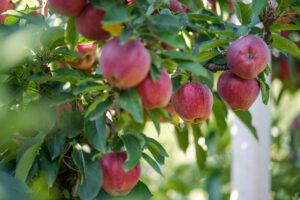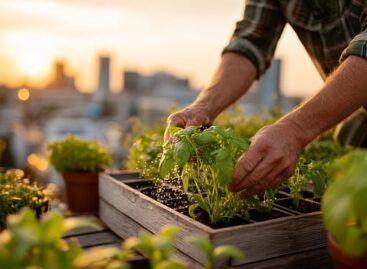The rainy summer was favorable for domestic apple orchards
The domestic apple producers can count on a good harvest this year, after last year’s severe drought damage, for the time being it seems that there will be something to harvest from the plantations. This year, the weather is also on the side of the apple producers: the spring frosts spared most plantations from serious frost damage, and the summer rich in precipitation and the relatively short periods of heatwaves help the development of the fruits – according to the National Chamber of Agrarian Economy and the Professional Association of Vegetables and Fruits From the common overview of the organization (FruitVeB). At the same time, the producers are not satisfied with the purchase prices of the juice apples, one domestic processor offers such a low price for the industrial grade apples, which may encourage many producers to abandon their activities.

(Photo: NAK)
Although the spring frosts had their effect on the apple orchards – the most significant frost damage occurred in Transdanubia and in the central region of the country – the apple orchards in the north-eastern part of the country, which is considered the most important growing region, were not seriously affected by the frost this year. The specialists did not experience any significant fruit binding or fruit drop problems in apples. Since May, the weather has had a particularly favorable effect on apple production, the abundant rainfall is good for plant development, and farmers do not have to fear heat and radiation stress caused by the heat this summer. Thanks to the sufficient rainfall, there will be no problem with fruit sizes this season, according to experts, even in non-irrigated plantations, the size of the fruits is now the same or even larger than last year’s harvest.
At the same time, storm damage is a major headache for farmers, due to this year’s capricious summer weather, there is more storm and ice damage on plantations than average
All this mainly affects the quality. The proportion of industrial apples is also increased by the appearance of fungal diseases, which are becoming more common due to the rainy and cool spring. According to the joint estimate of the National Chamber of Agrarian Economy and FruitVeB, a total apple harvest of around 500-550 thousand tons is expected this year. Of this amount, 400-430 thousand tons of industrial apples and 100-120 thousand tons of fruit destined for the fresh market can make up.
FruitVeB and then NAK organized two meetings on the subject before the apple season, first they discussed with the processors, then they sat down with the farmers
After the discussion, the producers in Szabolcs were right to be confident that the season would start with low prices. At the same time, one of the foreign-owned processors operating in Hungary published a purchase price last week, which according to the producers is a humiliatingly low amount. The Szabolcs-Szatmár-Bereg county organization of the chamber has received several indications that if the processors take over the apples so cheaply, the producers who farm 5-10 hectares will simply cut down their plantations and grow something else instead of apples.
By the way, apple production is taking place on approximately 20,564 hectares in Hungary this year
Our most important growing area is still the county of Szabolcs-Szatmár-Bereg, where there are a total of 15,136 hectares of apple orchards. In addition, farmers grow apples on a significant surface in the counties of Heves, Borsod-Abaúj-Zemplén, Jász-Nagykun-Szolnok and Zala. Unfortunately, the growing area is shrinking every year, ten years ago, for example, there were still around 30,000 hectares of apple orchards in the country. Looking at the prospects of the sector, the process may continue in the future, according to experts’ forecasts, the area under cultivation may decrease by about 1,000 hectares per year in the period ahead, but in the worst case, this process may accelerate drastically.
A significant part of the domestically produced apples goes to the domestic market
The majority of industrial apples are processed by juice plants, while customers can find food grade fruits in stores and markets. The range of varieties is very wide, the most popular are the Gala, Golden Delicious, Red Delicious, Jonagold and Idared varieties, but the range of new varieties expanding the range is constantly growing. In addition to being a real vitamin bomb, apples have a beneficial effect on preserving our general health, and in the autumn period they also play an important role in strengthening the immune system. Apples have a significant fiber content, which is of particular importance in terms of healthy eating.
NAK
Related news
State compensation for the victims of Bászna Gabona Zrt. has been completed
🎧 Hallgasd a cikket: Lejátszás Szünet Folytatás Leállítás Nyelv: Auto…
Read more >József Viski: Adaptation and competitiveness are key for the horticultural sector
🎧 Hallgasd a cikket: Lejátszás Szünet Folytatás Leállítás Nyelv: Auto…
Read more >Related news
Will AI tell us what we can buy in stores and for how much?
🎧 Hallgasd a cikket: Lejátszás Szünet Folytatás Leállítás Nyelv: Auto…
Read more >Important legislative changes: certain consumer rights now extend to SMEs
🎧 Hallgasd a cikket: Lejátszás Szünet Folytatás Leállítás Nyelv: Auto…
Read more >AM: focus on the role and protection of medicinal plants
🎧 Hallgasd a cikket: Lejátszás Szünet Folytatás Leállítás Nyelv: Auto…
Read more >








